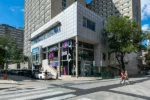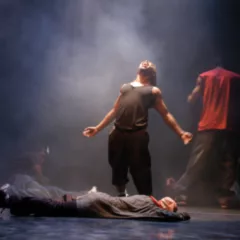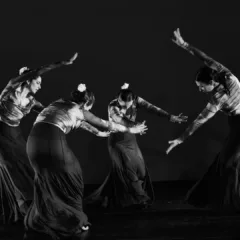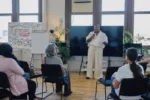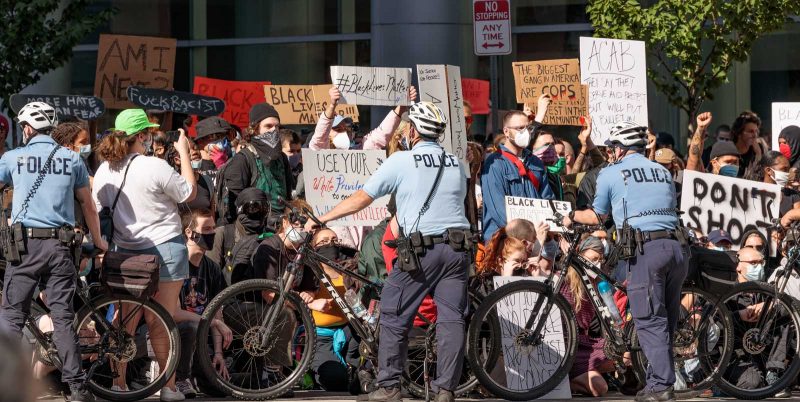
The continued murder by police of Black men and women
One out of four police encounters with a person in a mental health crisis in Philadelphia results in the killing of the person in the crisis. This disproportionately results in the fatality of Black people who– on top of already being the subject of racial profiling– are under-treated for mental illness. This continued police violence against Black people is traumatizing, which is a contributing mental health factor that once again disproportionately affects Black people.
Police are charged with protecting and serving but protestors have been asking them- “Who do you protect? Who do you serve?” Repeated police killings of Black men and woman — especially those in mental health crisis as with Walter Wallace Jr — are not protection but, rather, targeted harm against marginalized people.
Police violence does not serve the community. Philadelphians showed up in massive numbers after the murder of George Floyd to call to defund the police and invest in black lives, in the arts, in anything that would actually improve lives of Philadephians. The police were invented to catch slaves— that should be reason enough to abolish it and start anew. Or at the least, radically change it now.
What happened to Walter Wallace Jr in West Philadelphia this week is part of a vicious cycle that needs to be broken with equally radical action. We do not pretend to have the answers but, like many others, we recognize the obvious need to defund the police and invest in community and especially in black communities and black lives. Among things that black communities need are access to health care, mental health care; education and the arts. As an arts publication, we believe in investment in the arts (which were almost wholly defunded earlier this year while the police budget was only trimmed slightly).
Disarm the police now
When it is known that every Philadelphia police officer is armed with a gun but only one third of the police force is issued tasers and trained in their use, why does the police commissioner think an adequate response is “we aspire to it (100% taser use and training)”…basically, we’re working on it? When Philadephians banded together to protest in spite of a global pandemic to say, “Police violence is unacceptable and you have to stop now” did the police think an adequate response was tear gas?
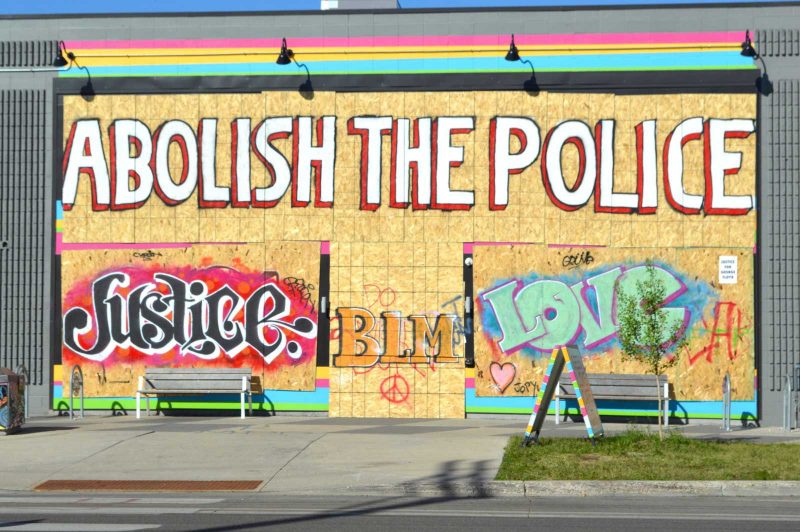
The police system is rotten and it is broken. As elsewhere, the Philadelphia Police culture has been shaped by a Rizzo-equse “us against them” mindset. It has been proven time and time again that under current police management, officers are not properly trained in nonviolent de-escalation. That, plus guns in the hands of every police officer, is a recipe for violence and death of many innocent (mostly black) people.
At the minimum, we suggest a goal of disarming the police, with interim steps of immediately providing tasers and taser training to 100% of the Philadelphia police force; immediate mandatory training in nonviolent de-escalation; and immediate removal from the field of police with histories of violence against Black people . But we say go even farther– start anew, to build a system that values people above violence and that values democracy above a military state — a system that wasn’t designed in its inception to target Black people.
Create a non-police alternative hotline for mental health and other medical episodes immediately
911 does not work for mental health emergencies, and it was never supposed to. Modern police forces were designed to respond to “disorder.” Walter Wallace’s family called 911 to ask for an ambulance— but instead of trained healthcare professionals, police showed up first and brutally murdered Wallace with 14 shots fired at relatively close range.
We need a new hotline set up for non-police emergencies. (And an alternative to a $1,000 ambulance ride.) People trained in de-escalation that you can trust will help you whether you are experiencing drug overdose, a panic attack, a suicidal episode, or domestic abuse.
Municipal budgets, federal budgets, state budgets need to be re-organized
We need a department of people protection, whatever you call it, composed of activists, therapists, public defenders, educators, social workers, and artists (who are trained in critical thinking, challenging norms, providing creative solutions). A department nested in the neighborhoods, that hires local community members as mentors, phone operators, citizen protectors. Train them all to support, protect, and uplift people.
We can learn from cities like Camden, New Jersey, who took a huge step in the right direction by disbanding and defunding their police but then didn’t handle the new system they set up very well, and community members were not adequately involved. Darnell Hardwick, the treasurer of the Camden NAACP, said “The whole narrative that the people were in it [forming the new police] from the beginning is a lie. What the people wanted was their own police department.” (Camden’s new police force is 46% white and most do not live in Camden; Camden residents are 80% Black and Latinx.)
In Philadelphia , we need to be leaders and install offices of community members and local activists in their own neighborhood. Give them office hours. Give them bicycles and tell them part of their job is to walk and bike the neighborhood and get to know the people and the issues so that they can properly protect and serve them.
As artists, as creatives, we see the need to think and suggest our way to the future. We recognize that radical change is overdue. We need to act immediately through meaningful discussion in neighborhoods and by modeling our own groups after ones like “Warriors in the Garden,” a group of like-minded people who are taking action and running for local office in NYC.
Artists, activists, critical thinkers– this is urgent. Philadelphia cannot keep arming the police to “protect and serve” us. It doesn’t work. With hard work and with the community, we can get there.


